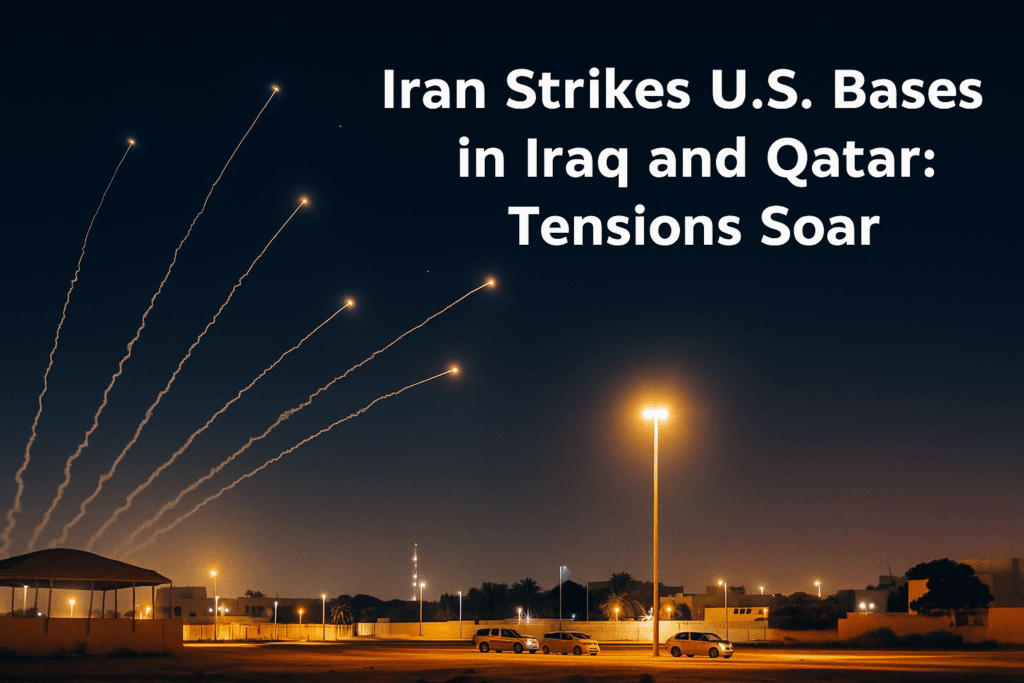
Iran launched missile strikes on U.S. military bases in Iraq and Qatar. Learn why the attack happened, what was targeted, and what this means for the region.
📰 What Happened?
On June 23, 2025, Iran launched a series of missile strikes targeting U.S. military installations in Iraq and Qatar, marking a significant escalation in Middle East tensions. According to regional defense sources, the attacks were carried out as a retaliation to recent U.S. airstrikes on Iranian nuclear infrastructure just days earlier.
The primary targets of Iran’s missiles were:
- Al Udeid Air Base in Qatar
- Ain al-Assad Air Base in western Iraq
These bases are home to key U.S. and allied forces in the Gulf, making the attack a direct challenge to U.S. military presence in the region.
🚨 Iran’s Retaliation: Operation “Fatah’s Blessing”
Iran’s state media confirmed the strikes under the name Operation Fatah’s Blessing, claiming it was a measured response to the U.S. bombings of underground Iranian nuclear facilities.
Iranian officials stated:
“The number of missiles fired equals the number of bombs dropped on our nuclear sites.”
While the attack caused minimal damage thanks to advanced missile defense systems, its symbolic weight was enormous — showcasing Iran’s regional reach and military precision.
📍 Where Were the Attacks?
🇶🇦 Qatar: Al Udeid Air Base
- One of the largest U.S. bases outside America.
- Qatar’s defense system intercepted several missiles mid-air.
- No casualties reported.
- Qatar condemned the attack, calling it a violation of its sovereignty.
🇮🇶 Iraq: Ain al-Assad Air Base
- Home to U.S. and coalition troops.
- Several missiles hit the outer perimeter.
- Iraqi government issued an emergency statement urging regional de-escalation.
💣 Why Did Iran Attack?
The strikes followed the U.S.’s deep-penetration bombings on Iranian nuclear sites on June 21, 2025. While the U.S. justified the bombings as a “preventive strike” to halt nuclear enrichment, Iran perceived them as an act of war.
Iran had warned of consequences, and this attack fulfilled that threat.
🌍 Global Reactions
| Country | Response |
|---|---|
| USA | National Security Council held urgent meetings; full military response still under review. |
| Qatar | Called for restraint, opened diplomatic channels to de-escalate. |
| Iraq | Condemned both U.S. airstrikes and Iranian retaliation. |
| UN | Called for immediate ceasefire and diplomatic resolution. |
| Russia & China | Urged all parties to return to the negotiating table. |
🤔 What’s Next?
While the missile attacks caused no large-scale destruction, the message is clear: Iran is prepared to escalate if provoked. The Gulf region remains on high alert, and commercial airspace over parts of Iraq, Qatar, Bahrain, and Kuwait has been temporarily restricted.
Analysts suggest this could trigger:
- New U.S. deployments to the Gulf
- Possible NATO emergency consultations
- Heightened energy market instability
📊 Quick Facts:
| Detail | Info |
|---|---|
| Date of Attack | June 23, 2025 |
| Iranian Operation Name | Fatah’s Blessing |
| Target Locations | Al Udeid (Qatar), Ain al-Assad (Iraq) |
| Casualties | None confirmed |
| Response | U.S. on standby, UN calls for diplomacy |
🕊️ Conclusion
The attack on U.S. military bases in Iraq and Qatar by Iran marks a dangerous turning point in U.S.–Iran relations. While immediate escalation has been avoided, the region remains tense and unpredictable. The world watches closely as diplomats scramble to contain what could become the biggest conflict in the Middle East in decades.

